Key takeaways:
- Crypto mining platforms enable collaboration among miners, allowing them to pool resources and increase earning potential through shared hashing power.
- Effective governance within mining pools fosters transparency, inclusivity, and trust, which are crucial to enhancing member engagement and communal success.
- Challenges in pool governance include achieving consensus among diverse members and ensuring equal participation to prevent marginalized voices.
- Clear communication, defined roles, and incentivizing participation can significantly improve governance effectiveness and enhance community engagement.
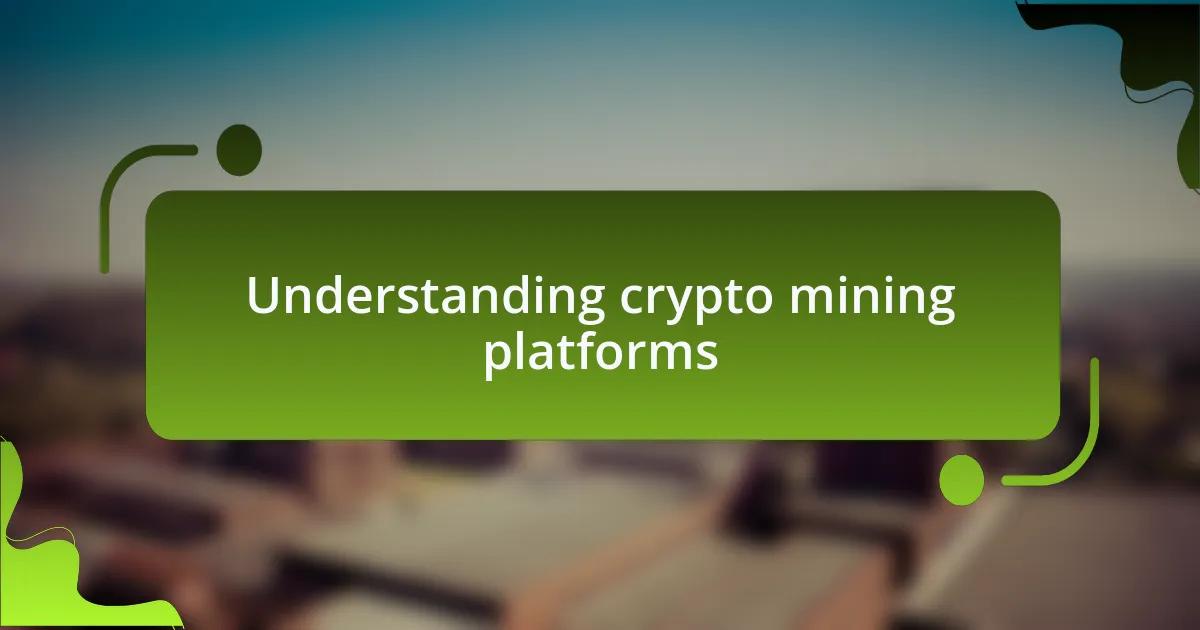
Understanding crypto mining platforms
When I first started exploring crypto mining platforms, I was struck by how they function as vital hubs for miners. These platforms provide the necessary infrastructure and software to connect miners, allowing them to pool their resources. It felt like joining a community where everyone shares a common goal, and that sense of collaboration was invigorating.
The technology behind these platforms can be complex, yet they simplify the mining process for users. For instance, using a mining pool means that individual miners can combine their hashing power, making it significantly easier to earn rewards. I remember feeling a sense of relief when I realized that instead of working alone, I could benefit from the collective strength of a pooled effort. Isn’t it fascinating how collaboration can amplify our individual efforts in a digital landscape?
Understanding the fees associated with these platforms is crucial as well, as they can impact potential earnings. Some platforms charge a percentage based on what you mine, and others have flat-rate fees. Early in my journey, I overlooked this aspect and was surprised by the deductions. It made me appreciate the level of transparency and fairness that a good platform should offer. So, what does that say about your choice of a mining platform? Being informed can make all the difference in your mining success.
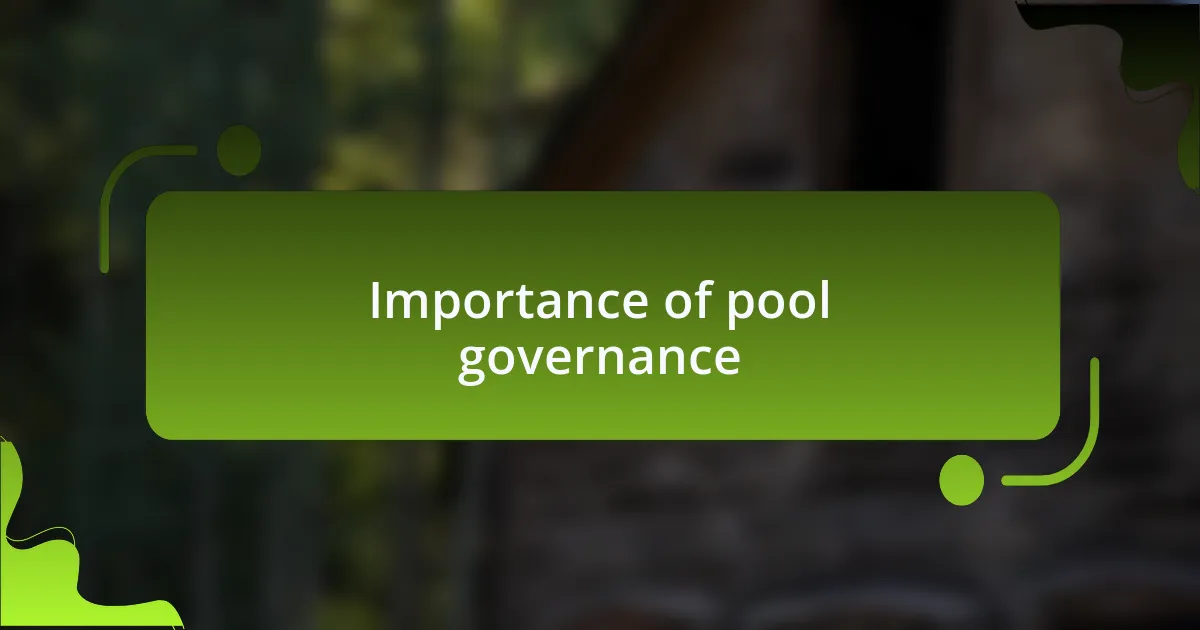
Importance of pool governance
Effective pool governance plays a vital role in ensuring that all miners feel represented and have a voice in decision-making processes. I remember attending a virtual meeting for my mining pool where governance was discussed. It was empowering to see how my vote, along with those of my peers, could influence strategies that affected our earnings and the overall direction of the pool. Have you ever considered how much your input could shape the success of a community you’re a part of?
Beyond just voting power, good governance helps to create transparency and trust within the pool. Reflecting on my early experiences, there were times when I hesitated to invest more resources because I wasn’t sure about the management’s decisions. However, pools that prioritize clear communication and inclusive policies not only attract more miners but also foster a sense of security. Isn’t it nice when you can collaborate with others, knowing that transparency is a cornerstone of your shared efforts?
Moreover, strong governance practices can mitigate risks and encourage sustainable growth. In one instance, a pool I was part of faced potential changes in mining algorithms, which could disrupt our operations. Thanks to proactive governance discussions, we collectively built a strategy that not only addressed the immediate concerns but also positioned us for future success. Have you ever wondered how much stability a well-governed pool could offer in a volatile mining environment?
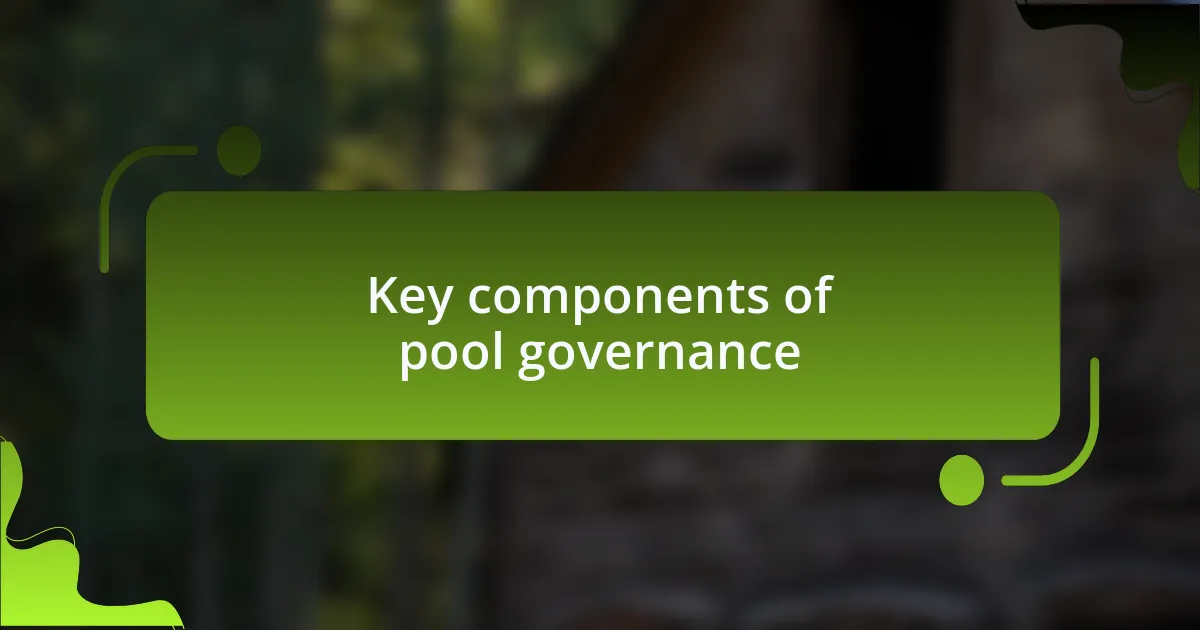
Key components of pool governance
Participatory decision-making is a cornerstone of effective pool governance. In my own experience, I’ve witnessed how inclusive discussions can lead to more innovative strategies. When miners collaborate and share their insights, it’s amazing how collective knowledge can surface unique solutions to challenges we face. Have you ever been part of a group where your ideas directly influenced the outcome? That kind of shared responsibility can be transformative.
Another key component is the enforcement of clear guidelines and rules. During my time in various mining pools, I noticed that those with robust governance frameworks tended to operate more smoothly. They set expectations and defined roles, which not only reduced misunderstandings but also built a sense of community among miners. How comforting is it to know that everyone is on the same page and working toward a common goal?
Lastly, transparency in operations is non-negotiable. I recall a situation early in my mining journey where a lack of clear communication left me feeling anxious about the pool’s management. When pools openly share information about their financial health and decision-making processes, it builds trust and encourages more participation. Have you ever felt more secure investing in something when you understand the inner workings? That trust can significantly enhance the stability of the entire mining ecosystem.
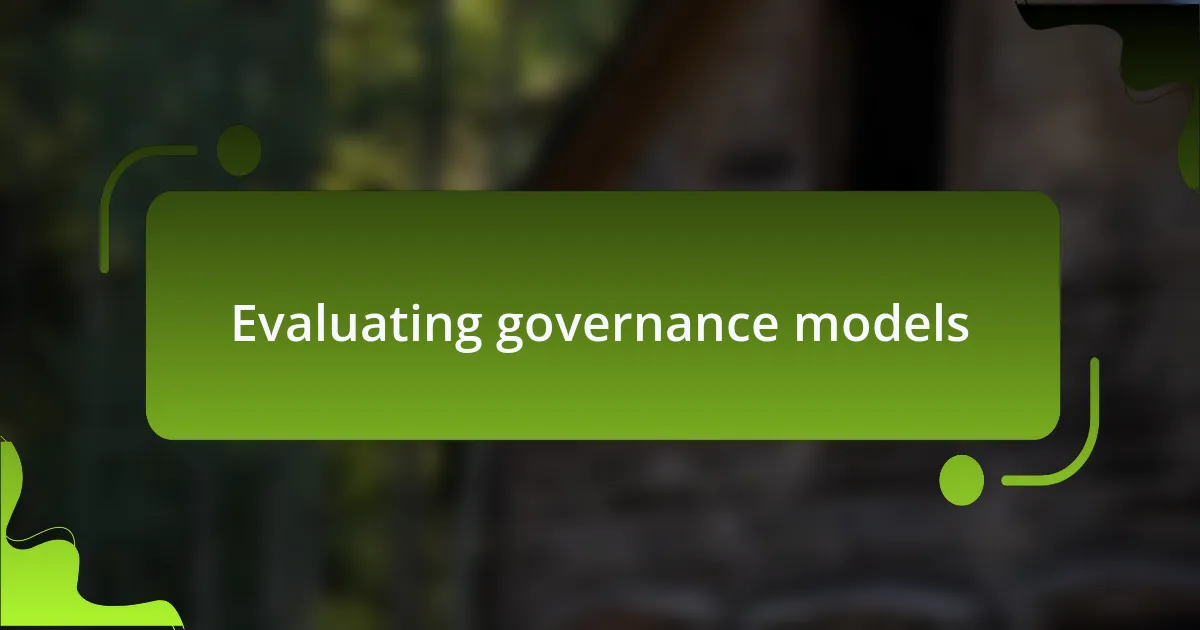
Evaluating governance models
When examining different governance models, it’s crucial to assess how they align with the core values of the community. In one mining pool I was part of, the leadership structure was flat and allowed for easy communication. This setup fostered a sense of ownership among members, encouraging proactive participation. Have you ever experienced the motivation that comes from having a say in the path forward?
Another aspect worth considering is adaptability within governance structures. I remember a time when my pool faced regulatory changes that prompted quick shifts in strategy. Our model allowed for rapid adjustments, keeping us compliant without excessive bureaucracy. Flexibility can be a significant asset; how well does your current governance model respond to changes in the landscape?
Lastly, evaluating the decision-making process is essential for understanding the effectiveness of a governance model. In my observations, pools that prioritize consensus-based decisions often cultivate a stronger sense of community. I noticed that during a major funding vote, the inclusive approach not only led to a well-informed outcome but also united the members. Isn’t it powerful when everyone feels their voice matters in shaping the future?
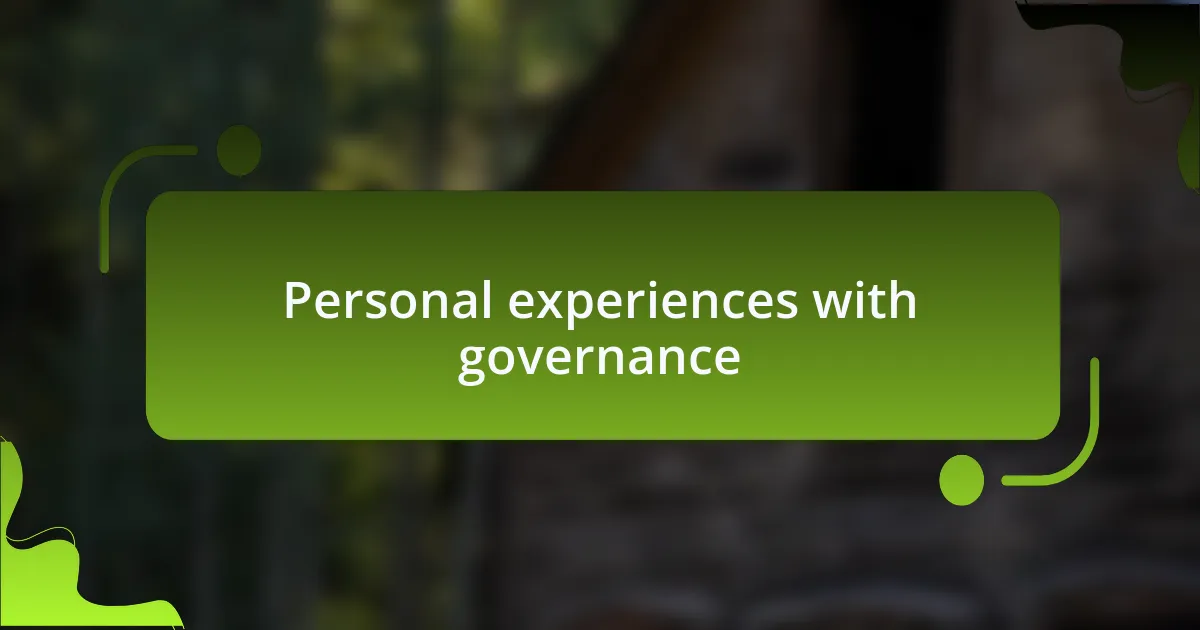
Personal experiences with governance
When I think back to my experiences with governance in various mining pools, one particular instance stands out. In a pool I joined, decision-making was often a team effort, and I vividly remember feeling a rush of pride when my suggestion was incorporated into a new initiative. Have you ever felt that thrill when your ideas are not just acknowledged but actively shape the direction of a group?
Another facet of governance that shaped my experience was transparency. I participated in a pool that held regular meetings, openly discussing both challenges and successes. It made me appreciate how much trust is built when everyone is in the loop. Have you ever been in a situation where not knowing created tension? Transparency can turn uncertainty into a strengthening bond among members.
Finally, I encountered a pool where governance seemed stagnant; decisions dragged on, and participation waned. I felt a sense of frustration as promising ideas faded away due to inaction. It made me realize how critical it is for governance structures to not just exist, but to actively engage and invigorate the community. Isn’t it disheartening when potential is left untapped due to bureaucratic hurdles?
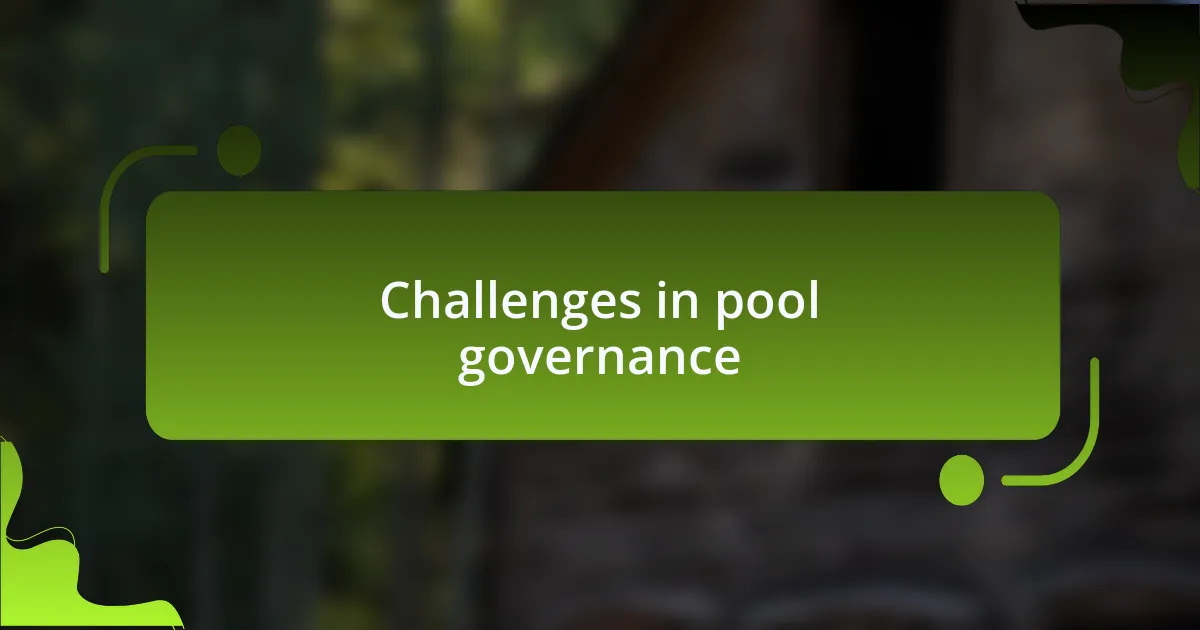
Challenges in pool governance
One of the most significant challenges in pool governance is achieving a consensus among diverse members. In a mining pool I once joined, I experienced firsthand the difficulties that arose when individuals had conflicting interests. It was frustrating to watch valuable discussions get sidetracked because not everyone could agree on a direction. Have you felt that tension when everyone seems to have a different vision?
Another hurdle that often goes unnoticed is the imbalance in participation levels. I frequently observed that a small group would dominate decision-making, leaving others feeling marginalized. This lack of equal representation can lead to disheartened members, ultimately driving them away from the pool. Isn’t it concerning when motivated individuals feel their voices aren’t heard?
Additionally, dealing with external pressures from market fluctuations presents a unique challenge. During a particularly volatile period, I watched our pool scramble to adapt to external demands rather than focusing on internal governance. The stress was palpable, and I couldn’t help but wonder how many valuable ideas were lost in the chaos. Can governance structures endure the storm, or do they crumble under pressure?
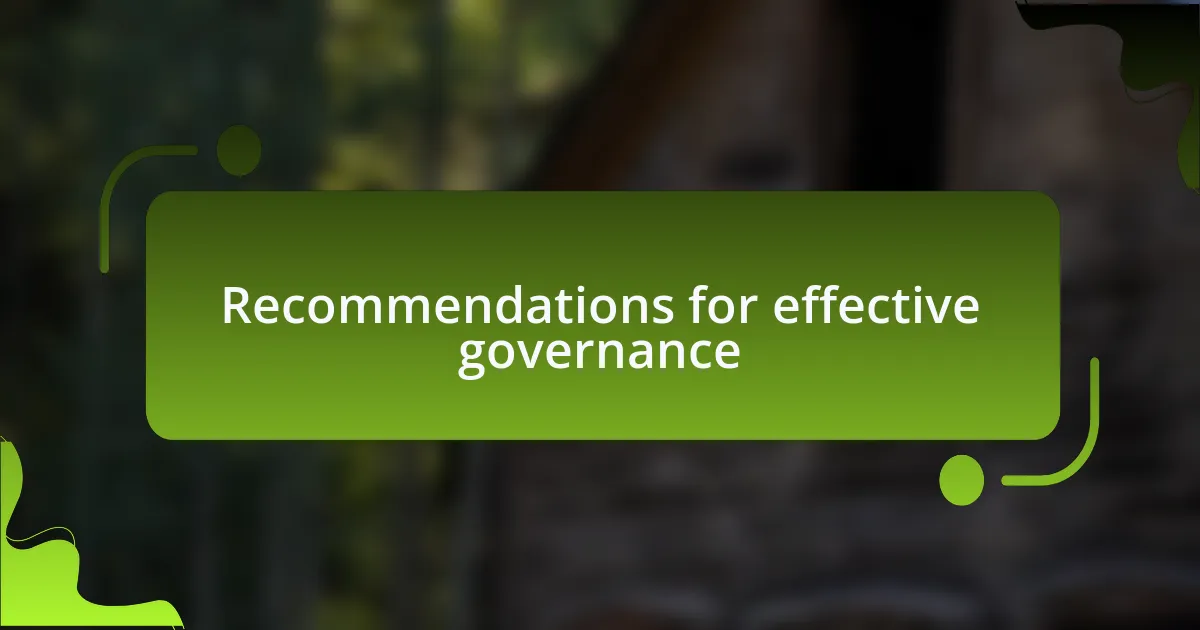
Recommendations for effective governance
Effective governance in mining pools relies heavily on clear communication channels. I recall a pool where we implemented regular update meetings, allowing everyone to engage with ongoing decisions. It was incredible how those simple sessions fostered a sense of unity; suddenly, everyone’s perspectives mattered, and we could tackle issues together. Don’t you think consistent dialogue could bridge the gaps that often lead to discord?
Moreover, establishing clear roles and responsibilities can significantly enhance governance. In one instance, I took on the task of a coordinator, responsible for gathering input from everyone before presenting it to the group. This structure minimized confusion and empowered others to contribute actively. Have you experienced a situation where clarity transformed participation?
Finally, incentivizing participation through rewards encourages a more equitable distribution of ideas and input. When I saw a mining pool introduce a point system based on contributions, the engagement skyrocketed. People were eager to share their thoughts, as they understood their involvement directly influenced decisions. Isn’t it fascinating how motivation can ignite a greater sense of belonging in a community?